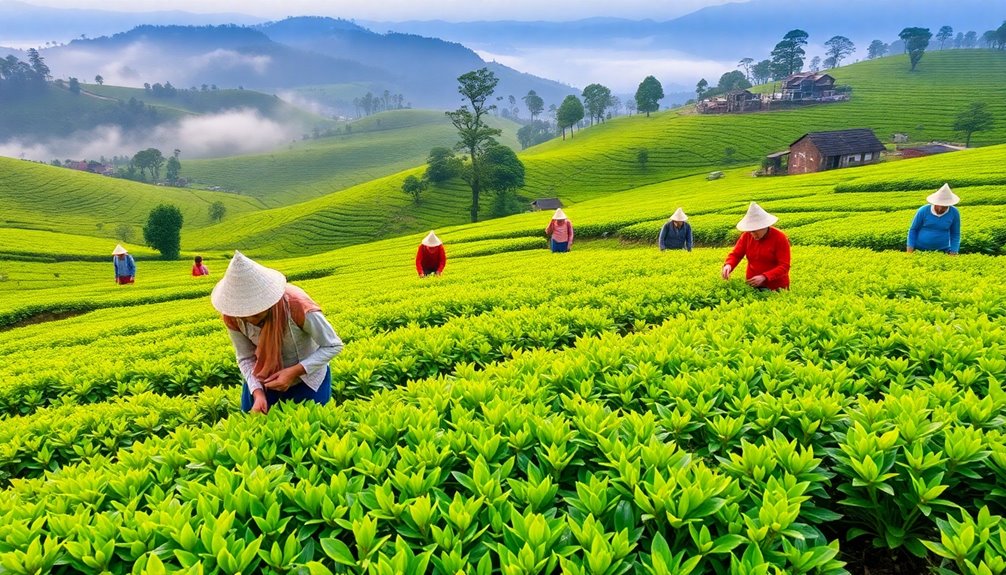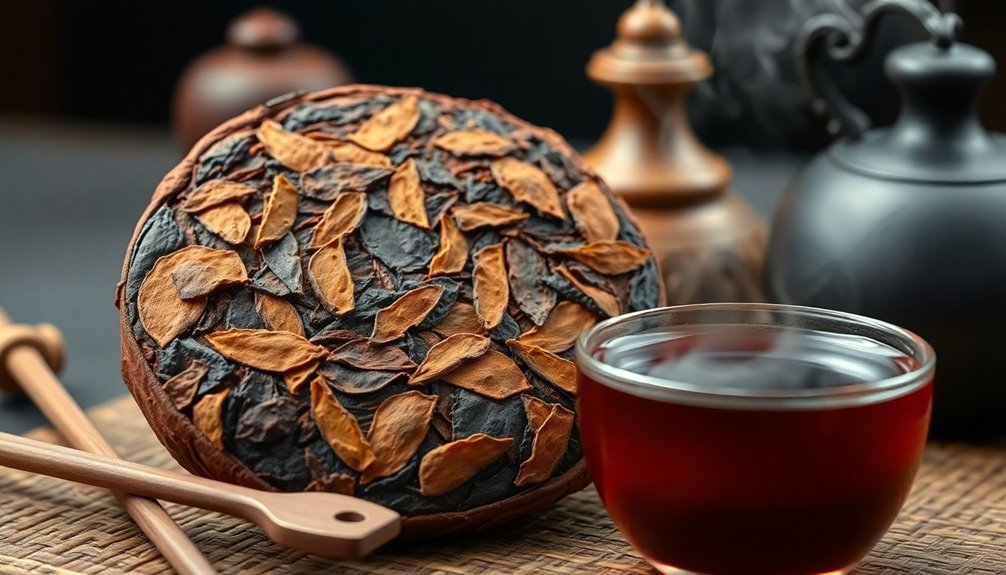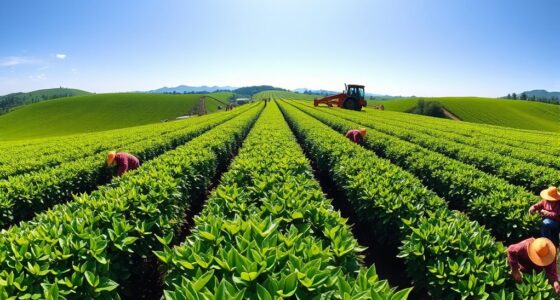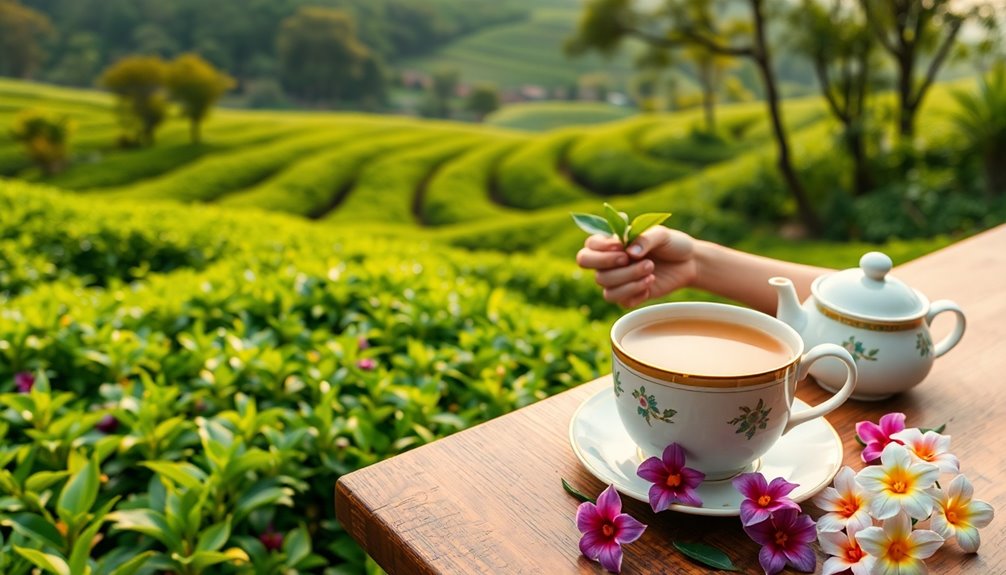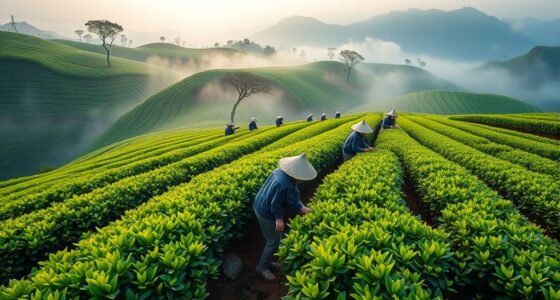When you sip your favorite tea, you're enjoying a story that begins with dedicated farmers! Many of these farmers come from family traditions, passing down special techniques. For example, Bei Bei Zhang, a fifth-generation farmer, creates delicious Lapsang Souchong tea. They often use sustainable methods, like organic farming, to help the environment and support wildlife. In places like Rwanda, tea cooperatives strive for fair pay and better lives for workers, mostly women. Plus, unique teas from around the world offer exciting flavors! Keep exploring, and you'll discover even more about the amazing people and practices behind your beloved brews.
Key Takeaways
- Many teas are produced by small family farms, where farmers like Bei Bei Zhang preserve traditional techniques passed down through generations.
- Sustainable farming practices, such as organic methods and agroforestry, enhance the quality of tea while protecting the environment.
- Unique heritage tea varieties, like Wuyi Oolong and Laoshan Black, reflect the distinct flavors derived from their specific growing regions.
- Labor rights initiatives, including Fair Trade certification, aim to improve the working conditions and livelihoods of tea workers, predominantly women.
- Supporting tea farmers not only empowers their communities but also contributes to sustainable development and local economies.
Introduction
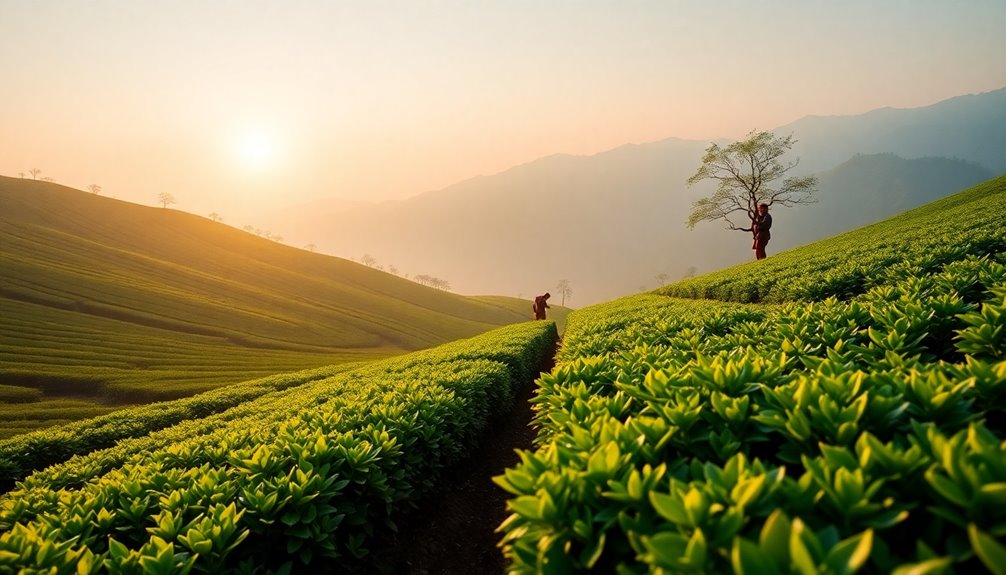
When you sip your favorite cup of tea, you mightn't realize the rich stories and traditions behind it. The tea you enjoy often comes from small family farms, where dedicated tea farmers work hard to grow and harvest the leaves.
These farmers, like Bei Bei Zhang, have generations of experience. Bei Bei, a fifth-generation tea farmer from Wu Yi Mountain, produces the beloved Lapsang Souchong tea, known for its smoky flavor.
Many tea farmers use unique techniques to make their tea special. For instance, Xie Xin Xu and Wen use charcoal roasting to bring out amazing flavors. This blend of tradition and innovation makes each cup of tea a delightful experience.
Geography plays a big role in tea quality, too. Farms in Wu Yi Mountain and Feng Huang Shan benefit from the perfect elevation and climate, giving their tea unique tastes.
These farmers are committed to preserving their cultural heritage, ensuring that their traditional methods remain alive even as markets change.
Tea Cultivation Traditions Passed Down
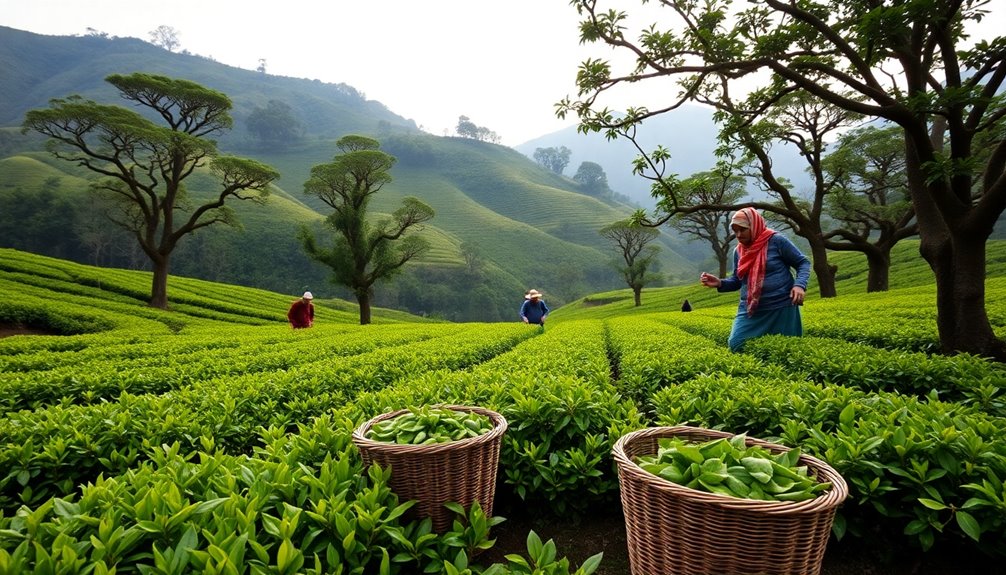
Tea cultivation traditions are a living legacy, passed down through generations of passionate farmers. You'll find that these dedicated tea farmers, like Bei Bei Zhang, keep the art of traditional smoked Lapsang Souchong alive in Wu Yi Mountain. Their love for tea shines through their hard work and commitment.
In Feng Huang Shan, Liu and Xie Xin Xu, third-generation farmers, specialize in Phoenix Dan Cong teas. They use traditional charcoal roasting techniques that their family has cherished for years.
Then there's Wen, who creates amazing charcoal roast white teas from Tai Mu Shan. His craftsmanship connects him to the tea-making practices of centuries past.
In Xi Shuang Ban Na, Luo works with ancient Pu Erh tea trees, highlighting the rich history behind these beloved flavors.
These tea farmers truly embody the idea of "Five Teas," each representing unique traditions and stories. The small family farms play a crucial role in preserving these artisanal techniques.
By maintaining their heritage, they ensure that the flavors and practices cherished for over 2000 years continue to thrive.
Sustainable Farming Practices Employed
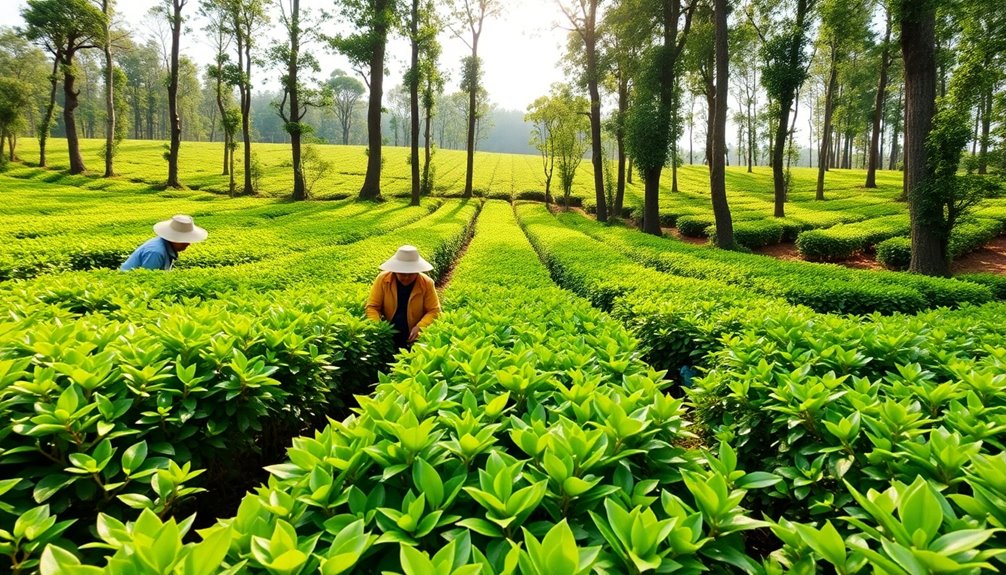
Embracing sustainable farming practices, many tea farmers are making significant strides in promoting healthier ecosystems. For instance, farmers in Rwanda are switching to organic methods, which means they're using fewer chemical fertilizers and pesticides. This not only helps the environment but also leads to tastier tea!
Agroforestry is another exciting approach tea farmers are adopting. By planting trees alongside tea bushes, they're boosting biodiversity and creating safe homes for wildlife. Isn't that amazing?
Water conservation techniques are also gaining popularity. Farmers are learning to use water wisely, which protects local sources and ensures their tea plants thrive.
Certification programs for sustainable tea production are becoming more common, too. These programs help farmers show off their commitment to caring for the planet.
Some cooperatives are even focusing on regenerative agriculture, which rebuilds soil health and keeps farms productive for years to come.
All these efforts by tea farmers mean you can enjoy your favorite tea while feeling good about where it comes from.
Heritage Tea Varieties Cultivated
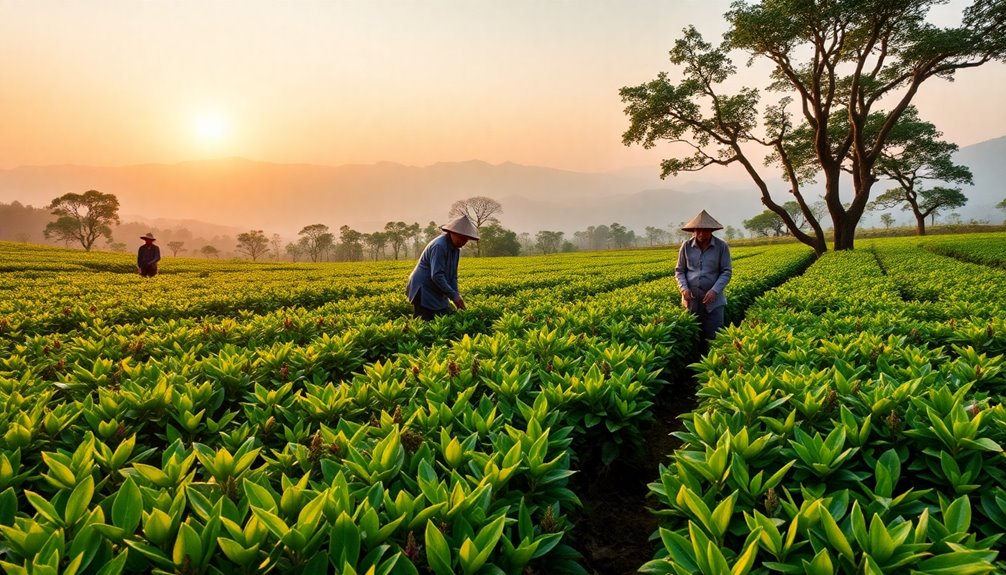
Across the globe, farmers are keeping alive traditional heritage tea varieties that not only offer unique flavors but also connect us to the rich history of tea cultivation.
In Laoshan Village, the He Family cultivates incredible Laoshan Black and Laoshan Green teas. These teas are famous for their distinct taste and careful production methods.
Meanwhile, the Li Family specializes in Wuyi Oolong, which is celebrated for its complex flavors that come from the mineral-rich soil of the Wuyi Mountain region.
Master Zhang in Anxi is known for his skill in crafting Anxi Oolong, a tea that delights with its floral aroma and smooth taste.
In Yunnan, farmers collect Qianjiazhai Wild Arbor Tea from ancient trees, adding to its unique flavors and high quality.
You'll also find farmers like Bei Bei Zhang in Wu Yi Mountain preserving heritage tea varieties, including the traditional smoked Lapsang Souchong.
Despite market changes, these dedicated farmers continue to honor their roots.
Labor Rights in Tea Production
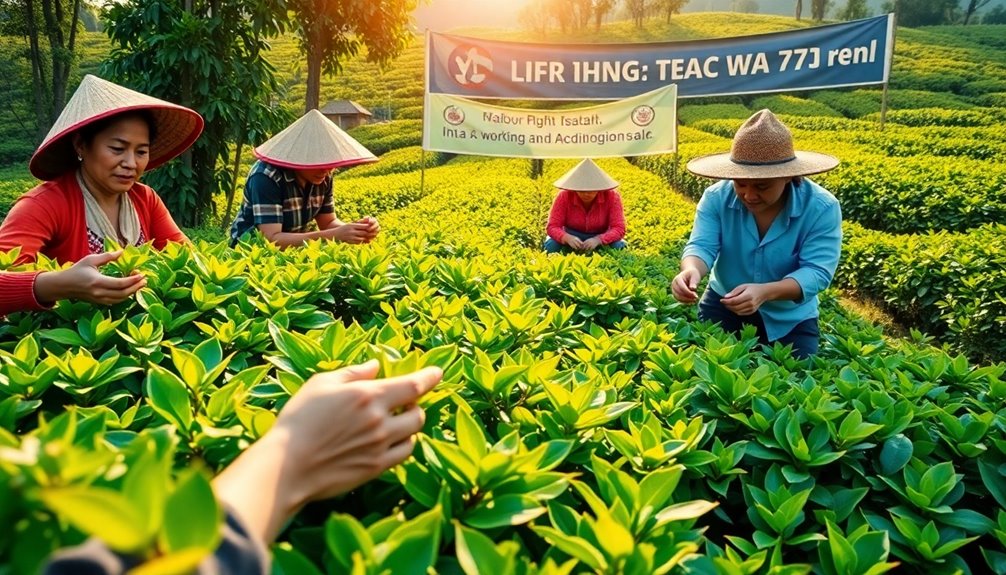
In recent years, awareness of labor rights in tea production has grown, highlighting the challenges faced by workers in the industry. Many tea farmers, especially women, work hard but earn low wages. This isn't fair, considering their important role in bringing us delicious tea.
In places like Rwanda, tea cooperatives have sprung up to help empower farmers and improve their lives. They focus on fair pay and better living conditions, creating a brighter future for everyone involved.
Did you know that about 70% of tea workers are women? It's crucial to support gender equality and protect their rights at work.
Programs like Fair Trade certification are stepping up, making sure tea producers get fair wages and work in safe environments. These efforts are vital, as they also advocate for better labor laws, healthcare access, and educational opportunities for families. Moreover, integrating secure payment processing in tea transactions can further enhance the livelihoods of farmers by ensuring they receive payments quickly and safely.
Practical Applications
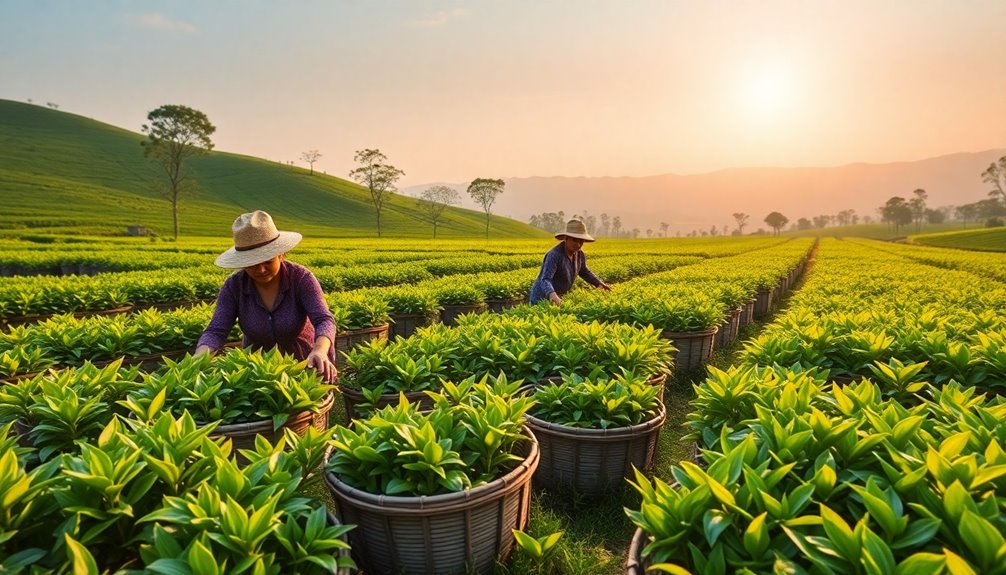
Recognizing the importance of labor rights in tea production opens the door to practical applications that can truly make a difference for farmers. In Rwanda, thousands of farmers, especially women, work hard to grow and process tea. This not only helps their families but also their entire communities. By dedicating around 26,000 hectares to tea cultivation, you can see how essential this industry is to the local economy.
Farmers are now using sustainable practices, like organic farming and agroforestry. These methods help the environment by improving biodiversity and reducing chemical use. Plus, tea profits fund community projects that boost education and healthcare, making life better for everyone.
However, climate change challenges these farmers. It affects tea yields and quality, so they need to adopt modern agricultural technologies. By improving their farming techniques and infrastructure, farmers can tackle these challenges head-on.
When you sip your favorite tea, remember the hardworking farmers behind it. Their dedication and innovative practices are helping to create a brighter future. Enjoying tea means supporting these farmers and their communities in their journey toward empowerment and sustainability!
Frequently Asked Questions
What Inspired These Farmers to Grow Tea?
You'll find that these farmers are inspired by their deep connection to the land, the desire to preserve traditions, and the hope of sharing their passion for tea with others, creating a community around their craft.
How Do Farmers Choose Which Tea Varieties to Cultivate?
Farmers choose tea varieties based on climate, soil conditions, and market demand. They experiment with different plants, observing growth patterns and flavor profiles, ensuring the chosen varieties thrive and meet consumer preferences for quality and taste.
What Challenges Do Farmers Face in Tea Production?
Farmers face various challenges in tea production, including unpredictable weather, pest infestations, and fluctuating market prices. These factors can impact yield and quality, forcing you to adapt and innovate to maintain a successful crop.
How Do Weather Conditions Affect Tea Farming?
Weather conditions directly impact tea farming by influencing growth cycles, yield quality, and pest prevalence. When temperatures fluctuate or rainfall patterns change, you'll notice the effects on your favorite tea's flavor and consistency.
Are There Any Festivals Celebrating Tea Farming?
Yes, there are several tea festivals worldwide celebrating tea farming. You'll find events showcasing traditional tea ceremonies, tastings, and local culture. Attending these festivals can deepen your appreciation for tea and its rich heritage.
Conclusion
Now that you know the farmers behind your favorite tea, you can appreciate every sip even more! These hardworking people use special traditions and sustainable practices to grow the best leaves. By choosing tea that supports their efforts, you're helping to protect their rights and the environment. So, next time you enjoy a warm cup, remember the joy and care that goes into it. Cheers to the farmers who make it all possible!

